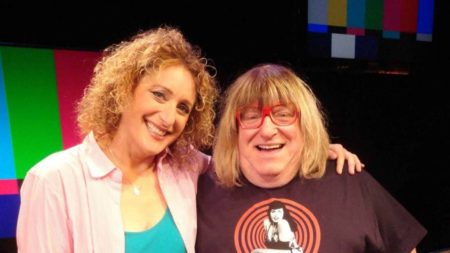The Jewish Journal
Vilanch: A Divine ‘Hair’ Apparent
by Naomi Pfefferman, Arts & Entertainment Editor
Two minutes into the interview, Bruce Vilanch kvetches about pantyhose. The hefty actor dons them eight times a week to play Edna Turnblad, the plus-size Baltimore hausfrau in the hit musical “Hairspray,” now at the Pantages Theatre.
As the, er, hair apparent to the role created by drag diva Divine in the 1988 John Waters film and Harvey Fierstein on Broadway, Vilanch dutifully squeezes into said hose, plus a 35-pound fat suit, and enough wigs to open his own sheitl shop.
“Did I mention that pantyhose were invented by a Nazi scientist?” the Jewish actor says. “I had to learn to get into them without a cherry-picker.”
With an exaggerated sigh, he explains that he makes the sacrifice for Art, and for a musical whose popsicle-colored exuberance is matched only by its political correctness. The Tony-winning show proffers its sweetly PC message in the winking tradition of “Grease” and “Little Shop of Horrors”: It revolves around chunky teenager Tracy Turnblad (Tony-winner Marissa Jaret Winokur) and her efforts to integrate a 1962 TV dance show, while coaxing her agoraphobic mother, Edna, out of her shell.
“It’s about the triumph of black people, fat people and, by extension, all outsiders,” says Vilanch, 56. “It’s about accepting who you are, then accepting others for who they are, and not judging — just dancing!”
His Edna undergoes an extreme makeover as she traverses the road to self-acceptance: The laundress initially appears in a faded floral print housedress and frumpy pincurls; but by the finale, she bursts out of an oversized can of Ultra Clutch hairspray, wearing a beehive and a flaming red ballgown.
If Edna changes her image via “Hairspray,” so does Vilanch. While he says he appeared in “every Stubby Kaye role” in college, he’s not known for musical theater or female impersonation. Instead, he developed his reputation as a pithy writer-to-the-stars, penning Oscar and Emmy broadcasts and droll speeches for celebrities such as Bette Midler. When he emerged in front of the camera, it was as a regular square on the “Hollywood Squares,” where he served as head writer, and as the subject of a 1999 documentary, “Get Bruce!” Instead of drag threads, his trademark costume consisted of T-shirts from his collection and a scruffy beard, which he shaved off for “Hairspray” on “Live With Regis and Kelly.” (“I didn’t realize I had all these jowls,” he says of the experience. “I looked like something the Hitchcock family left in the basement.”)
But Vilanch had worked on a one-man show with “Hairspray” composers Marc Shaiman and Scott Wittman, so he wasn’t completely shocked when the call came about auditioning for the show’s national tour in 2002.
“My agent said, ‘They’re looking for large men who are in touch with their feminine side,’ and I was delighted,” he says.
“I loved the story because it was a perfect sendup of the kind of hypocrisy I grew up with,” Vilanch adds. “The civil rights struggle was on, and there were people who pretended they weren’t racist but really were, and the show shoots them down beautifully, while at the same time, it describes the other outsiders, the overweight people; that was my story.”
Vilanch says he portrays Edna as a real woman, not as a drag queen, although it’s crucial for a man to play the role.
“The show is all about acceptance, so when the audience accepts that a man is playing Edna, they’re in on the joke,” he says. “It’s one of John Waters’ subversive little techniques.”
Vilanch once asked Waters if the Turnblads were Jewish: “Jerry Stiller is Wilbur the father in the movie, and he certainly cuts a Jewish swath,” he says. Waters said no, even though the musical’s Jewish creators threw Yiddishisms into a vaudeville number performed by the husband and wife.
“At one point, Wilbur says ‘Shabbat shalom’ to Edna for no apparent reason,” Vilanch says. “That got a huge laugh in Manhattan, but nothing in Rochester.” His solution was to ad-lib a line, now in the show, about the audience consisting of “only six Jews, including us.”
The Jewish Winokur, for her part, says the Edna-Tracy “relationship is very Jewish. It’s the overprotective mother and the young, ambitious girl who wants to do her own thing.”
Vilanch did his own thing by rewriting other lines that had worked for Fierstein, but not for himself.
“Some critics have compared me unfavorably with Harvey,” he says. “But I’ll never understand why a reviewer in say, Cincinnati, bothers to share that with his readers, who will never have the opportunity to see Harvey. It’s just so provincial; it’s showing off that they’ve been to New York.”
In Los Angeles, Variety praised Vilanch’s performance as “campier and funnier than Fierstein’s”; while the Los Angeles Times decreed it “overly hammy.” Yet, Vilanch was clearly the audience’s favorite during a recent Sunday night show, when viewers applauded practically every time he opened his mouth.
Wearing pantyhose is a small price to pay for such a successful midlife career change: “Next I’m doing ‘The Sound of Music,’” he says. “The moment this is over, I’m playing Maria.”


